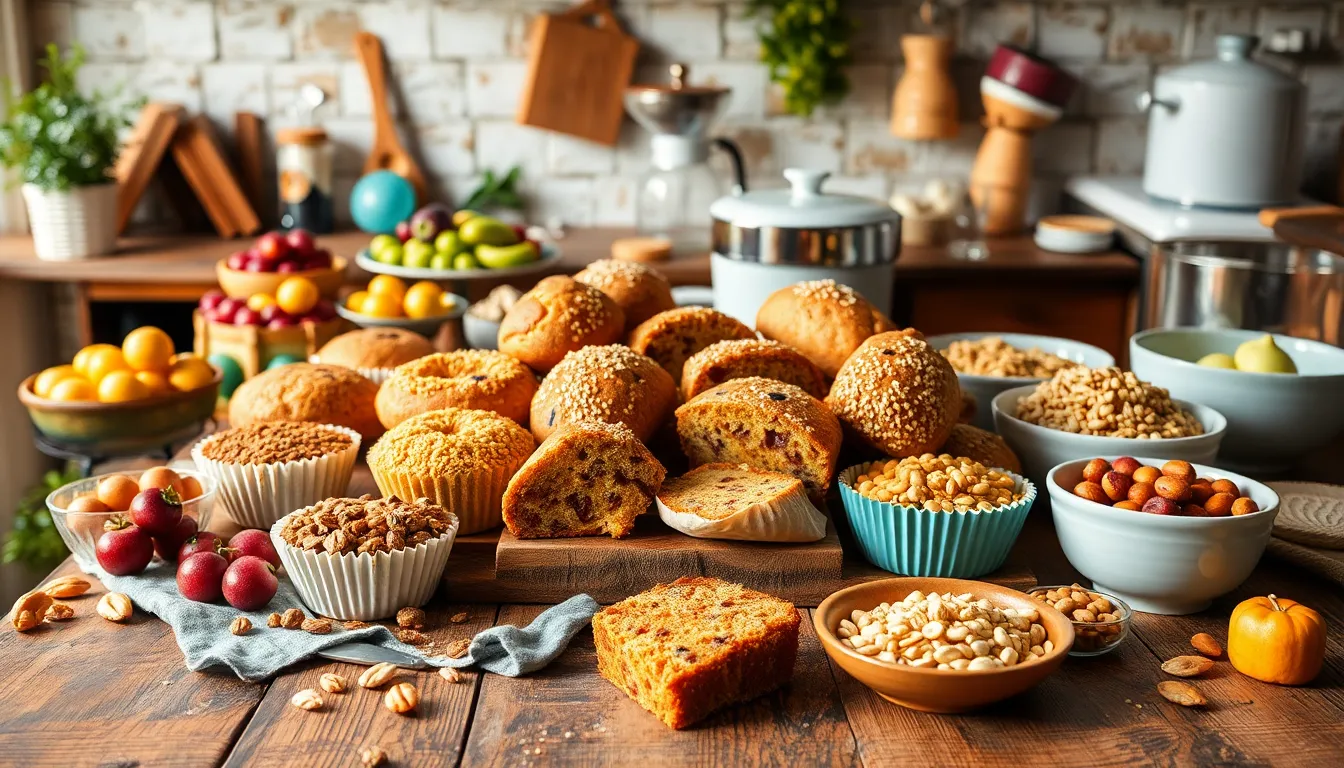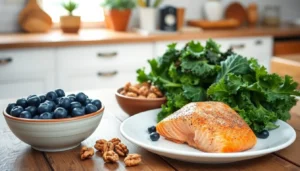Baking without eggs or dairy? It sounds like a challenge, but vegan baking is here to prove that delicious treats can be made without compromising on taste. Imagine whipping up a batch of cookies that are not only kind to animals but also kind to your taste buds. Vegan baking is the culinary superhero of the dessert world, transforming traditional recipes into plant-powered delights that even non-vegans can’t resist.
Table of Contents
ToggleWhat Is Vegan Baking?
Vegan baking creates desserts without animal products such as eggs and dairy. This approach relies on plant-based ingredients to achieve flavors and textures typically produced by traditional baking methods. Various substitutes exist for common ingredients. For instance, mashed bananas and applesauce often replace eggs, adding moisture and sweetness.
Many vegan bakers use nut milks or plant-based yogurts instead of dairy products. Almond milk and coconut yogurt maintain creaminess while keeping recipes cruelty-free. Additionally, vegan butter or coconut oil offers a rich alternative to traditional butter in cookie and cake recipes.
Plant-based sweeteners like maple syrup and agave nectar also enhance flavors while adhering to vegan principles. With careful ingredient selection, nearly any dessert can transform into a vegan offering. Traditional favorites such as brownies, cookies, and cakes can have delicious plant-based versions.
Numerous recipes cater to various dietary needs. Gluten-free and refined-sugar-free options abound, expanding accessibility to diverse audiences. By experimenting with natural ingredients, vegan bakers showcase creativity while delivering delightful treats.
Both vegans and non-vegans can enjoy the results. This inclusivity proves that plant-based baking does not compromise flavor or enjoyment. It’s possible to indulge in rich desserts while embracing ethical choices. Ultimately, vegan baking fosters a compassionate approach to sharing food, inviting everyone to partake in the deliciousness.
Benefits of Vegan Baking

Vegan baking offers numerous advantages beyond just being animal-friendly. It promotes a healthier lifestyle while supporting environmental sustainability.
Health Advantages
Vegan baked goods often contain fewer saturated fats compared to traditional options. Plant-based ingredients contribute essential nutrients like fiber and vitamins, which enhance overall well-being. Chronic diseases such as heart disease and diabetes may become less likely with a diet rich in whole foods and low in animal products. Furthermore, substituting refined sugars with natural sweeteners can decrease sugar intake, addressing common health concerns. Many vegan desserts also cater to dietary restrictions, providing gluten-free and refined-sugar-free alternatives that benefit a variety of consumers.
Environmental Impact
Vegan baking minimizes environmental harm associated with animal agriculture. Reducing dairy and egg consumption leads to lower greenhouse gas emissions, contributing to climate change mitigation. Plant-based ingredients demand fewer resources in terms of land and water, promoting a more sustainable food system. Reports indicate that adopting a vegan diet may reduce an individual’s carbon footprint by up to 50%. Choosing vegan baking not only satisfies sweet cravings but also helps preserve ecosystems and foster a healthier planet for future generations.
Essential Ingredients in Vegan Baking
Vegan baking requires specific ingredients to create delicious treats without animal products. Understanding substitutes for dairy and egg alternatives plays a crucial role in achieving desirable flavors and textures.
Substitutes for Dairy
Plant-based milk options, like almond, soy, and oat, replace cow’s milk in recipes. Vegan butter or coconut oil serves as a rich alternative to traditional butter, providing moisture and flavor. Yogurt derived from nuts or soy can substitute for dairy yogurt, enhancing creaminess. For recipes requiring cream, cashew cream or coconut cream offers similar richness. Sour cream can be mimicked using blended silken tofu with a splash of lemon juice. These alternatives maintain the taste and texture of traditional dairy products while adhering to vegan standards.
Egg Alternatives
Mashed bananas or applesauce function as effective egg replacements in baked goods. These fruits help bind ingredients and add moisture to recipes. Chia seeds or flaxseeds mixed with water create a gel-like substitute, acting as a binder in cakes and cookies. Silken tofu pureed until smooth can also substitute eggs, lending a creamy consistency. Commercial egg replacers, available in pharmacies or online, provide easy, reliable solutions for various recipes. Utilizing these alternatives ensures successful vegan baking while keeping the final products delicious and enjoyable.
Tips for Successful Vegan Baking
Successful vegan baking requires attention to detail and a good understanding of ingredients. Mastering techniques ensures delightful treats and satisfying results.
Accurate Measuring Techniques
Accurate measuring techniques are vital for consistent outcomes. Using a kitchen scale offers precise measurements for ingredients like flour and sugar. Liquid ingredients benefit from measuring cups designed for liquids, ensuring the correct volume. Spoon ingredients lightly rather than scooping directly from containers to avoid compaction. Tightly packed flour can disrupt the balance of wet and dry ingredients, leading to undesirable textures. Always level off dry ingredients with a straight edge for accuracy. Following these measuring strategies results in better texture and flavor in vegan baked goods.
Understanding Vegan Flours
Understanding vegan flours enhances the success of baking projects. All-purpose flour serves as a versatile base for many recipes, while whole wheat flour adds nutritional benefits. Almond flour contributes moisture and a nutty flavor, making it perfect for gluten-free options. Coconut flour absorbs more liquids and often requires adjustments to recipes, generally needing additional wet ingredients. Oat flour, made from ground oats, offers a mild taste and adds fiber. Each flour type impacts final outcomes, so combining different flours can create desired textures and flavors. Emphasizing appropriate flour selection leads to enjoyable vegan baked goods.
Popular Vegan Baked Goods
Vegan brownies attract many due to their fudgy texture and rich chocolate flavor. Notably, black beans or avocados can replace traditional butter, enhancing moisture without dairy.
Vegan cookies also enjoy popularity, showcasing endless flavor combinations. Peanut butter, oatmeal raisin, and chocolate chip varieties cater to diverse tastes, with options for gluten-free flour available.
Cakes, including vanilla, chocolate, and carrot, transform into delicious plant-based desserts. Applesauce and plant-based yogurt often serve as excellent egg substitutes while maintaining the cake’s light fluffiness.
Muffins rise to the occasion with fruit-infused recipes like banana, blueberry, and pumpkin spice. These sweet treats showcase versatile plant-based ingredients, providing fiber and nutrition.
Pies, such as vegan apple or pecan, maintain their classic appeal through natural sweeteners like maple syrup and agave. A crust made from nuts or oats rocks the texture, ensuring a delightful experience.
Breads, including banana bread and sourdough, remain a favorite. Vegan recipes often include flaxseed meal or chia seeds as egg replacements, delivering moisture and staying power.
Cheesecakes, often overlooked, also boast vegan options. Cashews, blended until creamy, create a delightful base, providing the same rich taste without dairy.
Donuts, another popular choice, offer indulgence without animal products. Baked or fried, they shine through creative toppings and flavors, appealing to all sweet lovers.
Vegan baking holds endless possibilities, ensuring delicious and accessible treats that satisfy any craving. These options cater to both vegans and non-vegans, promoting a plant-based lifestyle with flavor and creativity.
Vegan baking opens up a world of delicious possibilities that everyone can enjoy. By embracing plant-based ingredients, bakers can create treats that are not only satisfying but also promote a healthier lifestyle and a more sustainable planet. The versatility of vegan recipes allows for endless creativity in the kitchen, making it easy to adapt traditional favorites into mouthwatering plant-based versions.
Whether it’s a rich brownie or a fluffy cake, vegan baking proves that flavor and compassion can go hand in hand. With the right techniques and ingredients, anyone can master this art and share delightful desserts that cater to all dietary preferences. Embracing vegan baking is a sweet way to indulge while making a positive impact on health and the environment.





